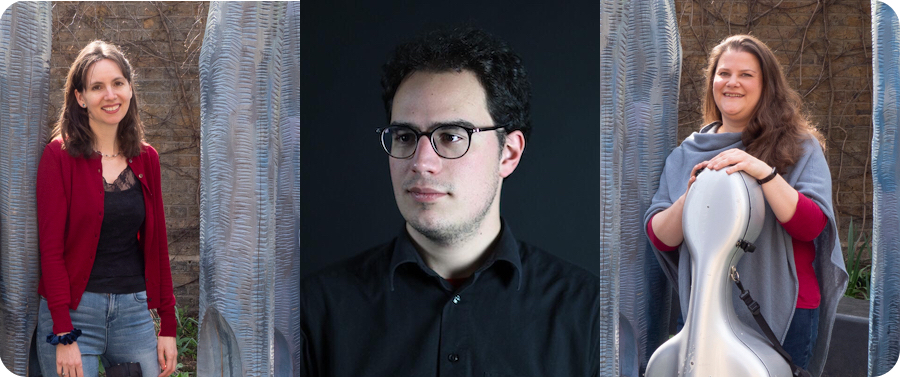
Sara Trickey (Violin)
Domonkos Csabay (Piano)
Rosie Biss (Cello)
Formed in 2015, The Odysseus Piano Trio is developing a reputation as one of the most dynamic and distinctive ensembles to emerge in recent years. Formed by well-known and distinguished musicians, the trio have performed at Kings Place, St David's Hall and regularly perform in festivals and for concert societies in the UK.
Joseph Haydn: Piano Trio No.39 in G major, the “Gypsy Rondo”
Johannes Brahms: Piano Trio No.2 in C major, Op.87
György Kurtág: Varga Bálint Ligaturája for Violin, Cello and Piano
For those of you who are unfamiliar with this trio, their reputation as a dynamic and distinctive ensemble is the net product of an exceptional wealth of individual expertise.
Rosie Biss is Principal Cello of Welsh National Opera, has guest-led the cello sections of many of the UK’s leading orchestras, including the BBC Orchestras of Wales and Scotland, and has performed across Europe and America with, among others, the Zehetmair Quartet and Trio, the European Music Project and the Scottish Ensemble.
Violinist Sara Trickey has won acclaim both as a soloist and a chamber musician, the former with such orchestras as the City of London Sinfonia and the English Symphony Orchestra, the latter with the Rossetti Ensemble and the award-winning Bronte String Quartet; she also performs regularly with pianist Dan Tong.
And, newcomer to the trio, Domonkos Csabay (piano) won 1st Prize at both the Birmingham International Piano Chamber Music Competition and the Lyon International Chamber Music Competition in a career that also runs the gamut from concert soloist to chamber musician to much-in-demand accompanist.
Put this much experience together and you are guaranteed something special.
‘Hungarian music’ is a snag-end-of-wool phrase…tug it and a knitwork of assumptions begins to unravel. It’s not nearly as bad as Voltaire’s demolition of the Holy Roman Empire (“neither Holy, nor Roman…”) but it does raise the question, to which Hungarian music are we referring? To the Magyar peasant songs recorded, in pioneering fashion, by Béla Bartók? To the ‘gypsy’ music popular in pre-World War Europe’s hotels and bars, dashed off with a flourish by travelling Roma bands? To the Roma’s own traditional tunes? Any, all and more of these have been titled ‘Hungarian’ over the years.
But what stands out clearly, even as precise definition eludes us, is the eye-batting allure of ‘Hungarianism’ to many eighteenth and nineteenth century Western composers…the exotic appeal of the ‘gypsy’ style, that pepper-pinch of romance, those distinctive harmonies and grace notes. Joseph Haydn’s Piano Trio No.39 in G major (1795), which opens our upcoming concert on Sunday 5th May, has been said to mark the beginning of this musical fascination with all things bohémian, with its swirling rhythms and soaring violin fireworks. The Hungarian violinist Joseph Joachim, who’d later perform the piece with a young Johannes Brahms, wrote of it “…it is the most characteristic music I have heard for a long time – one can really see the Hungarian Hussars twirling their moustaches and the Hungarian girls’ long nut-brown plaits getting entangled in the spurs as they dance” (letter to Clara Schumann, 1855).
Contact breeds contagion: Brahms, himself, was soon in Hungarianism’s thrall and a rat-tat-tat of Hungarian Dances quickly followed, although it’s his Piano Trio No.2 in C major, Op.87 (premiered in 1882) that will form the second half of our afternoon programme, a piece that has been called his “first unequivocal masterpiece for the piano trio” (even Brahms liked it and he was a notorious self-critic…). Idiomatic ‘gypsy’ figures abound: syncopation, rolled chords and, in the slow second movement, a theme of aching melancholy.
For the middle section of their performance, the Odysseus Piano Trio have chosen György Kurtág’s Varga Bálint Ligaturája for Violin, Cello and Piano (2007). Perhaps this is the most uncontroversially ‘Hungarian’ piece of all – for Kurtág is, arguably, Hungary’s greatest living composer. In a career spanning over seven decades, he has won numerous awards and widespread international recognition for his compositions for orchestra, opera, chamber ensembles, solo instrument and voice. The journalist and BBC Radio 3 presenter Tom Service has said of him, his work “speaks with a fearless directness that bypasses musical tradition and becomes its own idiom…It is full of the joys and despairs of life”. In other words, it defies labelling…and, maybe, we’re all the better for that?